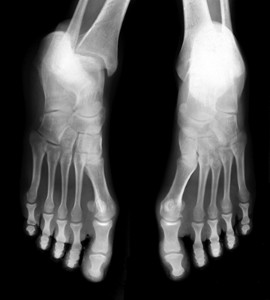 Stress fractures are small cracks in the bone typically caused by repetitive force or stress. While they can occur in various areas of the body, stress fractures are more likely to occur in the foot due to it having to bear weight and having to sustain repeated strikes. They can be very painful and often take time to properly heal. To avoid dealing with stress fractures, practice methods to prevent them from occurring. If you are starting a new physical activity, prevent stress fractures by taking it slowly and gradually increasing intensity and duration. This prevents overuse and allows your body to acclimate to physical stress. Footwear that provides proper support can improve your running style and prevent stress fractures. The surfaces you run on can also affect your risk for injury. Soft surfaces like grass can be more forgiving than harder surfaces like concrete. If you have questions about stress fractures and whether running is right for you, ask a podiatrist.
Stress fractures are small cracks in the bone typically caused by repetitive force or stress. While they can occur in various areas of the body, stress fractures are more likely to occur in the foot due to it having to bear weight and having to sustain repeated strikes. They can be very painful and often take time to properly heal. To avoid dealing with stress fractures, practice methods to prevent them from occurring. If you are starting a new physical activity, prevent stress fractures by taking it slowly and gradually increasing intensity and duration. This prevents overuse and allows your body to acclimate to physical stress. Footwear that provides proper support can improve your running style and prevent stress fractures. The surfaces you run on can also affect your risk for injury. Soft surfaces like grass can be more forgiving than harder surfaces like concrete. If you have questions about stress fractures and whether running is right for you, ask a podiatrist.
Activities where too much pressure is put on the feet can cause stress fractures. To learn more, contact one of our podiatrists from New England Foot and Ankle. Our doctors can provide the care you need to keep your pain free and on your feet.
Dealing with Stress Fractures of the Foot and Ankle
Stress fractures occur in the foot and ankle when muscles in these areas weaken from too much or too little use. The feet and ankles then lose support when walking or running from the impact of the ground. Since there is no protection, the bones receive the full impact of each step. Stress on the feet can cause cracks to form in the bones, thus creating stress fractures.
What Are Stress Fractures?
Stress fractures occur frequently in individuals whose daily activities cause great impact on the feet and ankles. Stress factors are most common among:
- Runners
- People affected with Osteoporosis
- Tennis or basketball players
- Gymnasts
- High impact workouts
Symptoms
Pain from the fractures occur in the area of the fractures and can be constant or intermittent. It will often cause sharp or dull pain with swelling and tenderness. Engaging in any kind of activity which involves high impact will aggravate pain.
If you have any questions please feel free to contact one of our offices located in Chelmsford and Newburyport, MA . We offer the newest diagnostic and treatment technologies for all your foot and ankle needs.
